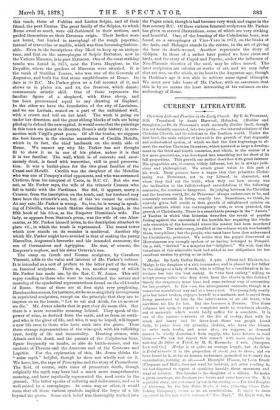CURRENT LITERATURE.
Christian Life and Practice in the Early Church. By E. do Pressens4, D.D. Translated by Annie Harwood, Holmdon. (Hodder and Stoughton.)—Dr. do Pressensics work naturally divides itself, though it is not formally separated, into two parts,—the internal relations of the Christian Church, and its relations to the heathen world. Under the first head, the main subject of interest is the growth of that dogmatic and ecclesiastical system, of which we find the first beginnings in al- most the earliest Christian literature, which received so largo a develop- ment in the third and fourth centuries, and which, in the course of a few more generations, was developed into something not far short of its full proportions. This growth our author describes with great fairness His sympathies are, of course, widely different, but he is always judi- cious and philosophical. We attach groat value to this part of his work. Many persons have a vague idea that primitive Christ- ianity was Protestant, not to say Liberal, in character, and when they find out the truth, when they see how strong was the inclination to the full-developed sacerdotalism of the following centuries, the reaction is dangerous. In judging between the Christian and the heathen world, Dr. do Pressonsd always endeavours to be, and commonly succeeds in being, exactly fair. Sometimes, we think, ho scarcely gives full credit to that growth of enlightened opinion on social matters which was contemporary with, or even preceded, the growth cf Christianity. There is a remarkable passage in the " Annals " of Tacitus in which that historian describes the revolt of popular feeling against the execution of the horrible law requiring the whole- sale execution of the household where the master had been murdered by a slave. The aristocracy, terrified at the volcano which was beneath them, was pitiless ; but the people, who must have been then unleavened by Christianity, protested. We notice that the papyri discovered at Herculaneum are wrongly spoken of as having belonged to Pompeii. On p. 366, " derided " is a misprint for " delighted." Wo wish that the translator of this admirable book had added to our obligations for her excellent version by giving us an index.


































 Previous page
Previous page